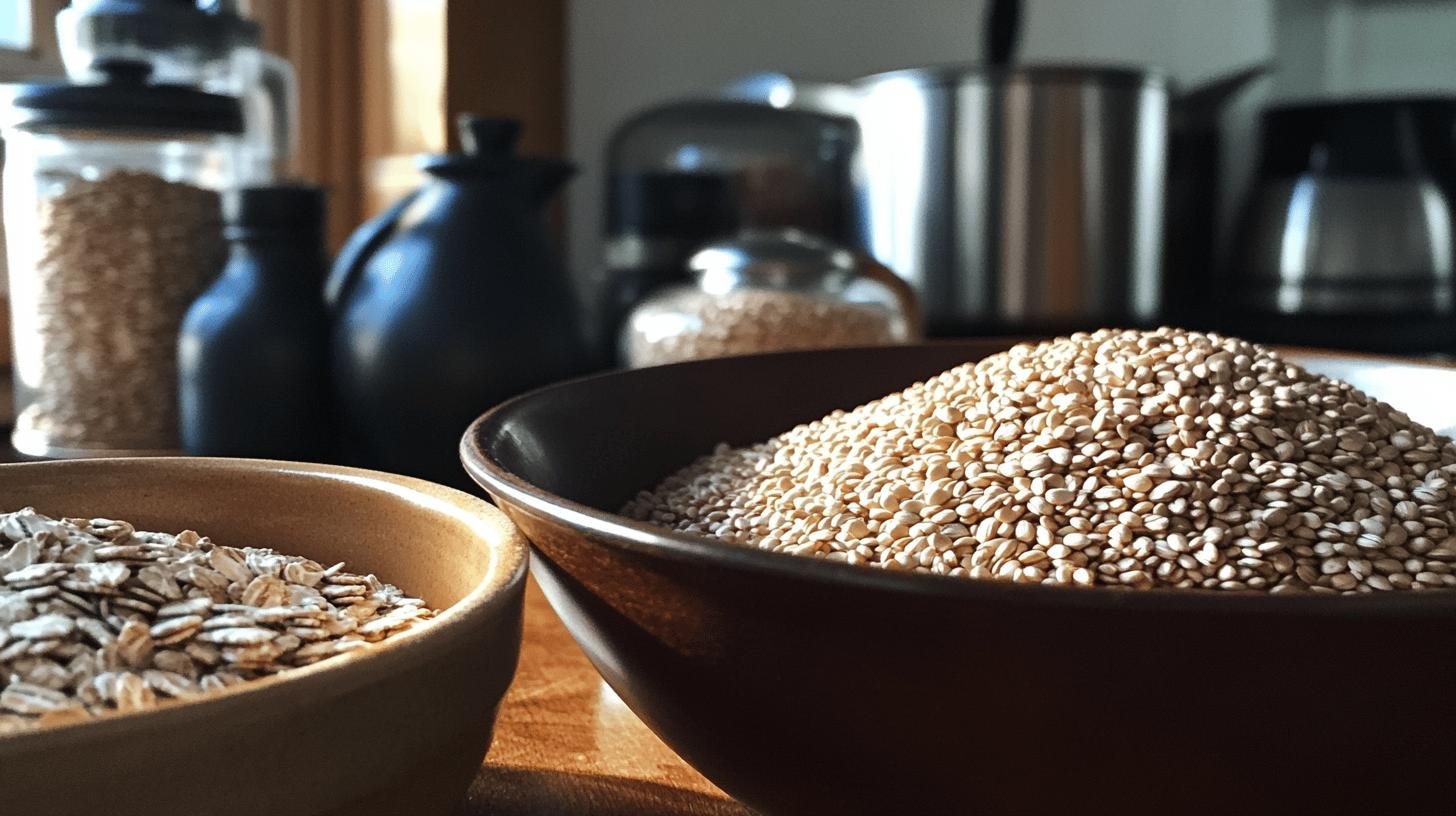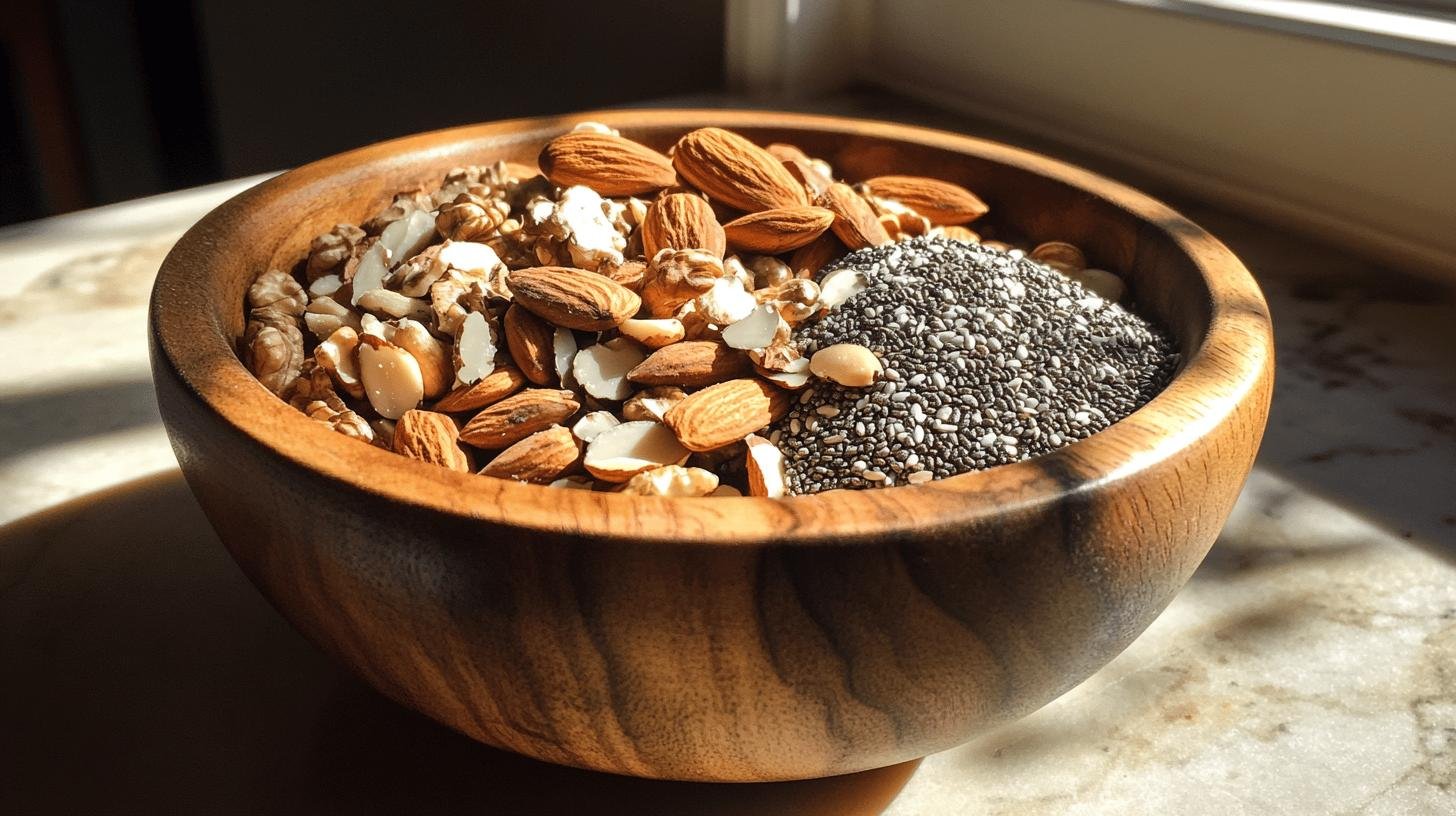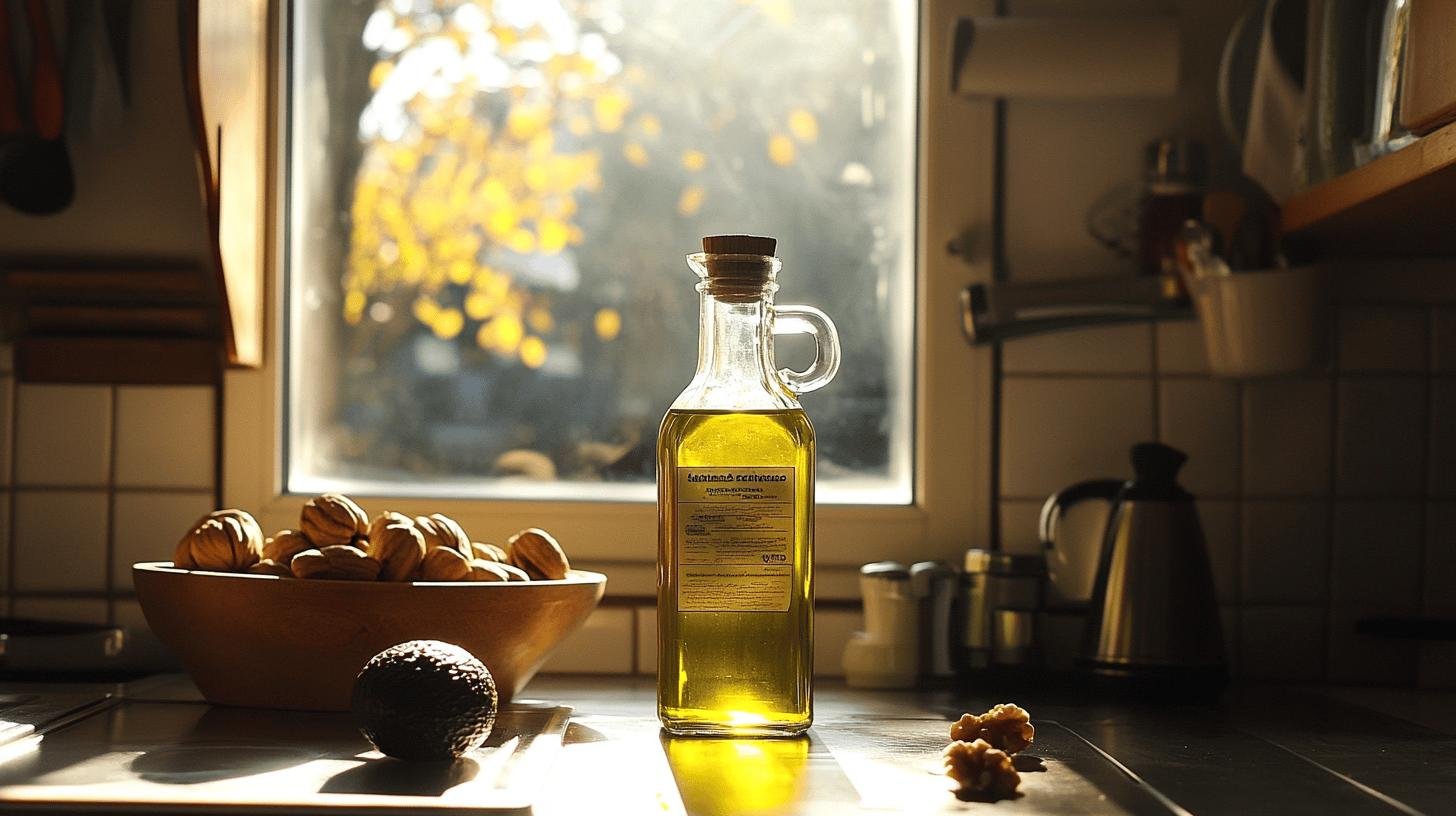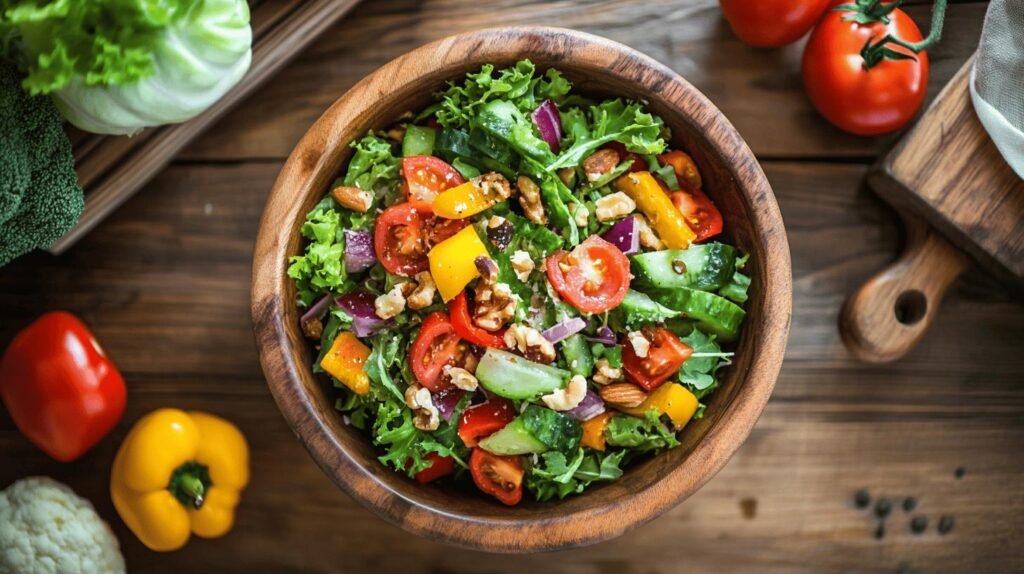TL;DR:
- Fruits & Vegetables for Heart Health: Blueberries, strawberries, oranges, spinach, and kale are rich in antioxidants, lower cholesterol, and regulate blood pressure.
- Whole Grains: Oats (lower cholesterol), barley (lowers blood sugar), navy beans (high fibre).
- Healthy Fats: Salmon, avocados, chia seeds, flax seeds; reduce inflammation and cholesterol levels.
- Nuts & Seeds: Walnuts, almonds, and flax seeds lower LDL cholesterol and provide omega-3s.
- Lean Proteins: Salmon, chicken, turkey, tofu, lentils; reduce heart disease risk.
- Cooking Oils: Olive oil (which reduces heart disease risk by 35%), avocado oil, and walnut oil.
- Dietary Habits: Focus on fruits/veggies, whole grains, balance, and portion control. Regular exercise is essential.
Ever wonder if a simple fruit salad could be your heart’s best friend? While we’re busy juggling life, our ticker needs some love, too. Luckily, it doesn’t involve boring meals—quite the opposite! This post explores the best foods for heart health, especially those starring fruits and veggies. Think of them as your heart’s knight in shining armour packed with antioxidants that fend off the bad guys (ahem, LDL cholesterol). Get ready to discover delicious choices that thrill your taste buds and also keeps your heart happy and healthy. Curious? Let’s dive into it!
Best Foods for Heart Health: Fruits and Vegetables
Antioxidants are key to keeping your heart in top condition. These powerful substances in fruits and vegetables fight free radicals, which can harm cells and speed up ageing. Blueberries and strawberries, for instance, are packed with antioxidants and have a low glycemic index. They not only boost heart health but also improve insulin resistance, LDL cholesterol, and blood vessel functions.
Consider these fruits and veggies for heart health:
- Blueberries
- Strawberries
- Oranges
- Spinach
- Kale
Scientific studies support the heart benefits of these foods. Take oranges, for example. They’re rich in a cholesterol-fighting fibre called pectin and potassium, which helps regulate blood pressure. Leafy greens like spinach and kale are not just for salads; they’re high in vitamin K and nitrates, which reduce blood pressure and support arterial health.
How can you add these healthy foods to your meals? It’s easy! Toss blueberries into your morning oatmeal or smoothie. Add spinach to wraps or salads for lunch. Sauté kale with garlic for a dinner side dish. When craving a snack, grab an orange. Simple swaps like these can lead to a heart-healthier lifestyle.
Whole Grains and Heart Health

Dietary fibre is essential for heart health, and whole grains have a lot of it. Fiber helps lower cholesterol, manage blood sugar, and keep your heart healthy. Oats, rich in beta-glucan, are perfect for the heart. Barley also helps by reducing cholesterol and blood sugar levels. Let’s not forget fibre-rich beans, like navy beans and lentils, which are excellent for your heart.
Here’s a snapshot of whole grains and their benefits:
| Grain Type | Heart Benefit |
|————-|——————————————-|
| Oats | High in beta-glucan, lowers cholesterol |
| Barley | Lowers cholesterol and blood sugar |
| Navy Beans | High fibre content, reduces cholesterol |
How do you incorporate these grains into your meals easily? Kick-start your day with oatmeal topped with berries. Replace white rice with barley in stir-fries. Add navy beans to soups, stews, or salads for a fibre boost. Small changes like these can significantly benefit your heart.
Healthy Fats and Omega-3 Fatty Acids for Heart Health
Omega-3 fatty acids are fantastic for your heart. They reduce heart rhythm disorders, lower blood pressure, and combat inflammation. You’ll mostly find omega-3s in fatty fish, but there are plant-based options too! These healthy fats are vital for a content heart and healthy arteries.
Here are foods rich in omega-3s and healthy fats:
- Salmon
- Avocados
- Chia seeds
- Flax seeds
Salmon is a star for omega-3s, helping reduce the risk of heart rhythm issues and inflammation. Avocados are rich in potassium, which lowers LDL cholesterol. Both chia and flax seeds are plant heroes, reducing triglycerides and boosting HDL cholesterol, putting your heart in great shape.
Want more heart-healthy fats in your diet? Include salmon in your weekly meals. Add avocado slices to toast or salads for creaminess. Sprinkle chia seeds into smoothies or yoghurt for an omega-3 boost. Don’t miss out on flax seeds—perfect for oatmeal or baking. These easy changes give your heart the care it needs.
Nuts and Seeds: Heart-Healthy Snacks

Nuts and seeds are often labelled as heart-healthy for a good reason. Walnuts, for example, are packed with antioxidants and essential nutrients like magnesium. They lower LDL cholesterol, the “bad” type you want less of. Almonds, loaded with plant sterols, fibre, and healthy fats, also reduce LDL cholesterol. Chia and flax seeds, however, provide omega-3 fatty acids that reduce triglycerides.
Top nuts and seeds for heart health include:
- Walnuts
- Almonds
- Flax seeds
How do you make these snacks part of your daily routine? It’s simple: keep a container of mixed nuts handy for a quick bite. A small handful of almonds daily is beneficial. Sprinkle flax seeds on cereal or yoghurt. Chia seeds blend well into smoothies. These little tweaks can make a big difference in heart health.
Lean Proteins and Heart Health
Proteins are the building blocks for a healthy heart, helping repair tissues and strengthening muscles. Lean proteins, like chicken or turkey, offer these benefits without the saturated fats that block arteries. Thus, proteins can be viewed as best friends to your heart, working behind the scenes.
What about plant-based proteins? Tofu is a superb source of vegetarian soy protein, rich in heart-friendly minerals, fibre, and fats. Legumes like lentils and chickpeas are high in protein and fibre, lowering cholesterol and protecting your heart.
Remember fish and lean meats! Salmon, rich in omega-3s, reduces inflammation and supports heart health. Lean meats like chicken provide protein without artery-clogging fats. Studies indicate that adding these proteins to your diet reduces your risk of heart disease. Whether tofu or salmon, heart-friendly proteins are plentiful.
Heart-Healthy Cooking Oils

Why are some oils a golden ticket for heart health? The right oils make a world of difference. Olive oil is rich in antioxidants and monounsaturated fats. Studies reveal that it can lower heart disease risk by up to 35%! Swapping trans fats for olive oil improves heart health. Avocado and walnut oils are equally great due to their unsaturated fats.
Here’s a breakdown of heart-friendly oils:
| Oil Type | Heart Benefit |
|————-|————————————————|
| Olive Oil | Reduces heart disease risk by 35% |
| Avocado Oil | High in unsaturated fats, supports heart health|
| Walnut Oil | Rich in unsaturated fats, promotes heart health|
How do you incorporate these oils into your cooking? Drizzle olive oil on salads or use it in marinades. Avocado oil’s high smoke point suits sautéing and frying. Walnut oil, with its nutty flavour, is best as a finishing oil. These small changes enhance dish flavours and support heart health.
Dietary Habits for Long-Term Heart Health
What are the key dietary rules for heart health? Eating fruits and veggies, limiting sugars, and choosing whole grains over refined ones can reduce the risk of heart disease. These foods are nutrient-rich and support heart health. Lean proteins and healthy fats, like those in fish and nuts, are vital, too. They maintain muscle and clear arteries.
Why are balance and portion control significant? Overdoing even healthy foods can be harmful. A balanced diet supplies a proper mix of carbs, proteins, and fats. Too much of one can lead to weight gain, which harms your heart. Portion control lets you enjoy favourites without overdoing them.
How can you incorporate these habits into your life? A diverse diet and regular weekly exercise—150 minutes of moderate activity—work wonders. Start with small changes: choose fruits over sugary snacks, choose whole grains, and add more veggies. Keeping things simple and steady makes it easier to stick with these heart-healthy habits long-term.
Final Words
Eating well for your heart means more than just nibbling on the occasional salad. It’s about making conscious choices every day. From savouring antioxidant-rich berries to adding whole grains to your meals, we know how these foods make a difference. Toss in some healthy fats with fish or avocados, and you’ve got yourself a heart-healthy diet!
Each small change counts toward the best foods for heart health. Whether you’re snacking on nuts or swapping oils, every step gets us closer to a healthier heart.
FAQ
What foods are healthiest for the heart?
Fruits and veggies like blueberries, strawberries, oranges, spinach, and kale are amazing for heart health. They pack antioxidants, which help fight off heart disease and support better overall circulation.
What foods make your heart stronger?
Omega-3-rich foods like salmon, avocados, chia seeds, and flax seeds are stellar for heart strength. These healthy fats can tune up your heart rhythms, lower blood pressure, and kick bad cholesterol to the curb.
How can I make my heart stronger?
Eat a heart-friendly diet with plenty of fruits, veggies, healthy fats, and lean proteins. Exercise regularly and choose whole grains to keep your ticker in tip-top shape.
What drink cleans the heart?
Green tea is a great heart cleanser. Packed with antioxidants, it can help lower bad cholesterol and improve blood flow. Sip some daily for a tasty heart-boost!

